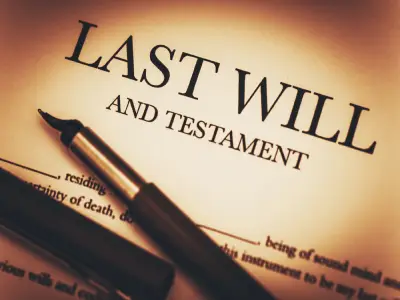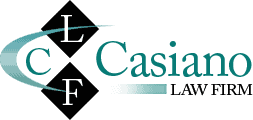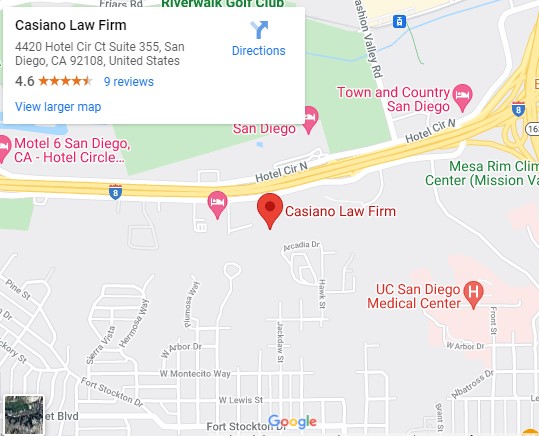Common Problems with Last Wills and Testaments in San Diego, CA
Upon the death of a loved one, learning that their Last Will and Testament contains wrong information might come as a shock. For a number of reasons, people sometimes make mistakes while writing their wills that cannot be rectified after their death. For instance, if your mother gives you 30 acres of property but the lot in issue is really 300 acres, how do you prove it was a typo error and not the deceased’s true wishes?
 There are many reasons why erroneous information makes its way into California wills. Any number of complications at Probate might arise if complete legal names are not given, property descriptions are incomplete, or bank accounts are not mentioned. California wills that haven’t been updated in a long time. Misspelled names and other clerical mistakes generally won’t be a big deal. However, factual errors, such as an estate’s value, the existence of a valuable item, or a misinterpretation of legal words, are unlikely to be reversed by a probate process..
There are many reasons why erroneous information makes its way into California wills. Any number of complications at Probate might arise if complete legal names are not given, property descriptions are incomplete, or bank accounts are not mentioned. California wills that haven’t been updated in a long time. Misspelled names and other clerical mistakes generally won’t be a big deal. However, factual errors, such as an estate’s value, the existence of a valuable item, or a misinterpretation of legal words, are unlikely to be reversed by a probate process..
If you are convinced that the Will does not accurately represent your loved one’s wishes due to factual errors, you will almost certainly have to dispute the Will. If you suspect your loved one signed the Will with no understanding of what was in it, an estate planning lawyer may be able to help you in proving the Will invalid.
You can be confident that these mistakes won’t be made when you work with a San Diego estate planning attorney to create your Last Will and Testament. After you make a will, your attorney should contact you every few years to make any necessary revisions.
If you are unclear about the status of a loved one’s Will, and think there’s some legal issues, ask if you may see it and have an attorney evaluate it while the loved one is still living. If you have any concerns relating to Wills in San Diego, California, simply contact Casiano Law Firm.
Eleven Common Problems with Last Wills and Testaments
-
- Ambiguities. When language or phrase is vague or might be understood in a number of different ways, it is said to be ambiguous. For instance, the will may name only one person as the only beneficiary yet subsequently allocate property to others.
- Vague Designations. It is very important to be very clear regarding who will inherit your property and manage your estate. However, the terminology used in designating may be confusing, such as appointing “my sister” as executor when there are other sisters still alive.
- Typed Errors. Typographical and numerical errors might raise doubts about the provision’s true intent. For instance, it might be challenging to ascertain the decedent’s actual charitable bequest if the will specifies a gift of “four hundred (4000) dollars” to a certain organization.
- Insufficient Information. A will may provide provisions for children but fail to precisely identify each child, allowing children born outside of the marriage or from earlier partnerships to come forward.
- Failed Gifts. If a gift cannot be transferred to a recipient as specified in the will, the deceased’s intentions may be undermined. For example, the deceased may leave a specific property to his brother. The brother dies three years later, but the deceased fails to have the will updated. When the deceased dies, the property may be claimed by the deceased’s surviving spouse and children, the brother’s surviving spouse and children, or by a contingent beneficiary.
- The Will is Not Dated. There is no way to know how old the will is without a date. If other wills are presented to the probate court, the judge will have difficulty deciding which will is the most recent.
- Out-of-date Information. A will should be updated on a regular basis to keep it up-to-date and accurate. If not, a will could give away things that the deceased person no longer has, give property and money to ex-spouses, or leave out children who were born after writing the will.
- The Will Does Not Fulfill California Formalities Requirements. A will must fulfill California’s “formalities” standards in order to be considered legally valid. These criteria pertain to particular elements of the document itself that must be present. These are some examples:
- Did the testator (the one who wrote the will) have full mental capacity at the time the will was written?
- Have two people witnessed and signed the will?
- A classic typed will must be signed by two witnesses in the presence of the testator and each other. Many of the wills contain just one witness’ signature. If the will does not have two witnesses, was the will written in the testator’s handwriting?
- Was the will signed by the testator?
- The will needs to state what it is and what it is for. Was the testator’s intention for the document to serve as his or her will?
Some property, like life insurance proceeds and trusts, may be taxed even if it is not part of your estate.transfer
- Overlooking Debts, Taxes, and other Financial Considerations. Potential debts (like your personal debts and bills, as well as any gift, income, or state and federal estate taxes) may result in your beneficiaries inheriting less than you intended. Even if the federal estate tax threshold is relatively high ($5.43 million in 2015), don’t assume that your estate is too little to be taxed: your state’s estate tax laws might have a substantially lower threshold.
- Choosing a Bad Executor. Your executor will be the person in charge of administering your estate, therefore appoint someone you can trust. If your executor is unable to function in this role (for example, is no longer of sound mind or has died), you must replace the executor in your will. Also, inform the executor of your decision of choosing them before drafting the will to ensure that they would accept the burden.
- Creating Joint Tenancy Assets. These enable a person to take over the ownership of real estate after the death of the original grantor or to help in writing checks on a bank account, for example. Unfortunately, the unexpected implications of these arrangements might result in a lawsuit. For example, a person who added someone as a joint tenant to a checking account may not have realized that the whole account would transfer to the joint tenant instead of the estate.
- Undue Influence. Undue influence is defined under the California Elder Abuse and Dependent Adult Civil Protection Act as “excessive persuasion that induces another person to act or abstain from acting by overpowering that person’s free will and resulting in injustice.”
Excessive persuasion is a very subjective concept that varies widely depending on the situation. As a result, the Act provides considerations that a judge must examine when assessing whether someone used undue influence to override someone’s will. They are as follows:
- The Actions or Strategies Used by the Influencer to Exert Control Over the Victim. Withholding food, medicine, sleep, and other necessities of life are examples. Controlling the victim’s access to information or contacts with other people is another common practice. A person’s will may also be conquered by the use of affection, coercion, or intimidation. Changes in personal rights or property rights can also be a sign of wrongdoing (especially when the influencer claims expertise in the issue, takes action in secret or under claims of time pressure, or initiates them at inappropriate times or places).
- The Vulnerability of the Victim. Physical incapacity, mental impairment, any injuries that handicapped the victim, the victim’s age and education level, emotional anguish, if anybody separated the victim from other sources of assistance and knowledge, and whether the victim relied on others to satisfy critical needs. A court may also assess whether the influencer was aware of, or should have been aware of, such a vulnerability.
- Any Apparent Power the Influencer Has Over the Victim. Such power may be exercised by a family meber, fiduciaries, spiritual advisers, caregivers, healthcare professionals, legal professionals, or specialists with other clear credentials.
- The Outcome’s Fairness. While an unfavorable result can not show undue influence on its own, it might strengthen arguments that improper or unanticipated conduct resulted in excessive influence. Unfair consequences call into question problematic behavior.
13. Incorrectly Executing Codicil To Will. A codicil is an addition or change to a final will and testament. It takes priority over the original legal document if it is properly dated and attested, and so lawfully overrides the will. The phrase itself derives from the Latin codicillus, which translates as “a short writing” – a perfect description of what a codicil should be.
Your codicil is not a new will, and it should not be utilized to make major modifications to various areas of your will. Consider your codicil to be a chance to make a short addition or adjustment to the content of your will.
You can modify your will at any time until your death. Amending a will with a codicil, on the other hand, often has to be done in a certain way according to California law, so you must be sure you’re following it in order for your changes to take effect.
Avoid Problems with Last Wills and Testaments through California Estate Planning Attorney
When your final will and testament are presented for probate, these problems might cause major complications. A will contest, for example, can ensue. Will contests can be costly, time-consuming, and stressful. At worst, your will would be overturned and proclaimed null and void. In such an event, the laws of the State of California would govern the transfer of your assets.
It is not ideal to have a San Diego probate-court decide where your estate assets go. You probably want to give certain things away and distribute your estate in a certain way. You may also wish to incorporate certain terms and conditions in your will. If your will includes flaws, your intentions may not be carried out.
If you’re ready to make the best estate plan for your family or need help in making a will or have any estate planning issues, don’t hesitate to set up an appointment with Casiano Law Firm.
Don’t put it off until it’s too late! Speak with San Diego estate litigation attorney Vincent Casiano who can provide the legal advice you need to care for your family.

